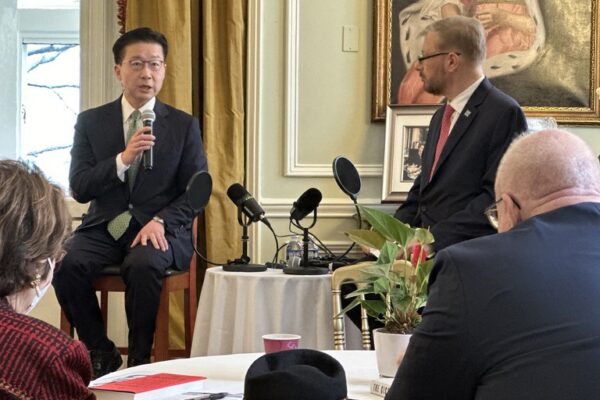North Korea’s next global “charm offensive” will be led by leader Kim Jong Un’s younger sister, Kim Yo Jong, who is the strategic mastermind in Pyongyang and could eventually succeed her brother in power. At least that’s according to Sung-Yoon Lee, a North Korea expert and fellow at the Wilson Center who late last year released a 304-page biography about the woman he calls “the brains” behind the despotic rule of her brother, a man he says is more interested in basketball. “She is really the mastermind of this family campaign to expand their influence over South Korea and beyond,” Lee said at a book-signing event hosted by the Committee for Human Rights in North Korea at DACOR Bacon House in Washington, D.C., on Thursday morning. Lee told the gathering that his book, titled “The Sister: North Korea’s Kim Yo Jong, the Most Dangerous Woman in the World,” was years in the making, with his interest piqued by her attendance at her father’s funeral in 2011, when the world knew little about her or her brother. Even though in Korea, the “proper way to express your sorrow is to really overdo it, to exaggerate and wail away almost deliriously,” Lee said, noting there was an added incentive to do so in the North, Kim Yo Jong “showed genuine, profound sadness” but otherwise felt no need to go further, even when the cameras were trained on her face. Sung-Yoon Lee, left, speaks alongside Committee for Human Rights in North Korea Executive Director Greg Scarlatoiu at an event at DACOR Bacon House in Washington, D.C., on Jan. 25, 2024. (Alex Willemyns/RFA) In the years that followed, he said, her always perfectly upright posture, “Mona Lisa smile” and “imperious” demeanor when appearing in public made him more curious about her role leading the hermit kingdom. “Unfortunately, I see in her eyes a sparkle – intelligence,” he said. “I saw that in Kim Jong Il, too, and in Kim Il Sung, the state founder. They were intelligent; they were not crazy, in the conventional sense.” “I don’t see that sparkle in Kim Jong Un,” he added. Winter Olympics The wider world first got to know Kim Yo Jong, believed to be 37 years old, at the February 2018 Winter Olympics in the South Korean city of PyeongChang, which took place in the lead-up to then-U.S. President Donald Trump and Kim Jong Un’s first meeting in June 2018. With South and North Korea fielding a united team, Kim Yo Jong was invited to the south to represent Pyongyang in meetings with then-South Korean President Moon Jae-In and to attend the games. After arriving at Incheon airport “not showing any bit of excitement or happiness that she was there … [almost] as if she had walked into her own living room,” she later attended the games’ opening ceremony, where she was seated directly behind Moon and U.S. Vice President Mike Pence, who famously chose to “ignore” her presence behind him. “Throughout the evening, from certain camera angles, it seemed she was lording it over Mike Pence, seated right behind,” Lee said, adding that the visual was sought by North Korea for propaganda reasons. “Later, I learned that this was not an accident,” he said. “Kim Yo Jong had insisted that she be seated behind them – above President Moon and Vice President Pence – or else ‘We go back home.’” “So accommodations were made,” he explained. The Sister: North Korea’s Kim Yo Jong, the Most Dangerous Woman in the World by Sung-Yoon Lee is about Kim Jong Un’s increasingly powerful sister, tapped to be his successor to lead North Korea. (Courtesy of PublicAffairs) The next day, Kim Yo Jong visited Moon at his offices in Seoul and for a short while became “a star” on the world stage, with many seemingly enchanted by the sudden emergence of a female North Korean leader. More importantly, after months of escalating provocations between her brother and Trump, her message of peace and reconciliation seemed to resonate as more sincere than if it had come from Kim Jong Un. ‘Don’t trust her’ Lee says that is a mistake he hopes to shatter with his biography, arguing Kim Yo Jong will be wheeled out as the friendly face of the North’s global outreach when it once again tries to appear open to compromise. He called for the world not to be fooled. “She is the No. 2 official in arguably the world’s most tyrannical regime,” he added. “What she says, no matter how sweet it may sound, must be questioned and cannot be accepted at face value.” A switch back to diplomatic niceties after the ongoing round of provocations is as predictable as the plot to Rambo 4, Lee said, noting that “[Rambo] First Blood was a good movie, but by the time you’ve seen Rambo 4, you have a pretty good idea how the movie ends.” As the true director of North Korea’s propaganda department since 2012, he said, Kim Yo Jong was a skilled political operator, and would be even more at ease on the world stage her second time around. Kim Yo Jong, right, shakes hands with South Korea’s director of the National Security Office, Chung Eui-yong, June 12, 2019 as she delivers a condolence message in Panmunjom in the Demilitarized Zone (DMZ) from her brother to the family of former South Korean first lady Lee He-ho, who passed away. (Korean Central News Agency/AFP) “People will want to believe in her message, and perhaps even share in the credit that she seeks peace and denuclearization,” Lee said. “Don’t trust her. Don’t believe everything she says. Don’t patronize her.” “She’s not to be underestimated,” he said. Eventually, Kim Yo Jong may position herself to take over the reins from her brother, even if the current leader’s daughter, Kim Ju Ae, born in 2013, has been slated as the heir apparent in Pyongyang. “When [Ju Ae] is in her mid-20s, and comes to view her auntie as expendable, cumbersome…








